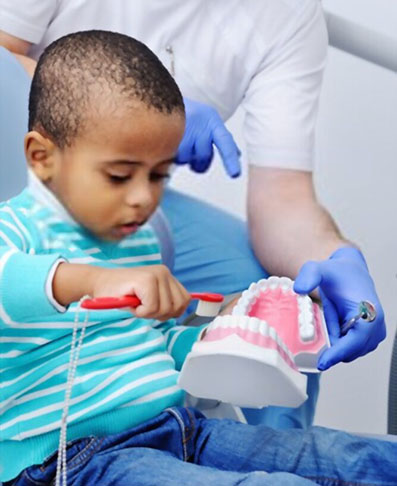Children’s Dental Care
Although primary teeth are only temporary, they play an important role in your child’s oral health. These developmental stages are very influential. Your child’s future health greatly depends on early pediatric care. Allowing your child to see a dentist creates awareness on proper dental hygiene from a young age. The proper habits that they develop as children will carry on to their adult years. This can prevent a number of tooth problems and dental expenses.
Your child can begin their regular visits to the dentist as early as one or two years of age. This will allow the dentist to begin any preventive care and dental treatments necessary for your child’s health. For example, your dentist will be able to keep their mouth clean by removing plaque and food debris. This would prevent the growth of bacteria and other dental problems, like tooth decay.
Pediatric dentists can also give you expert advice on how to best take care of your children’s teeth. They can give you advice on how to teach your child to develop healthy dental habits. These habits include proper brushing techniques, tooth flossing, and the importance of healthy diets. The dentist would also be able to detect the condition of your child’s teeth at this early stage.
Children’s Dental Care is focused on proper prevention and early treatment. These are important to ensure that your child has a lifetime of good dental health. It also helps to reduce cost in the long run, as problems are dealt with before they become serious.

But my child is afraid of dentist…
It is common for children to be afraid of visiting the dentist. There are many reasons that a child could be afraid of the dentist, including:
- the sight of dental equipment
- emotions concerned with threat avoidance
- poor preparation for the dental visit
- fear of pain
- a history of painful experiences
Often, the child’s fear might be a product of a parent’s fear. A mom’s or dad’s anxiety can easily be transferred to the child. It is, therefore, important for a parent to learn to control their behavior in the clinic. As a parent, it is also imperative that you use positive language when talking about the dentist. Avoid voicing your own fears and concerns about the dentist around your children.
Detecting the reason why your child is afraid of the dentist will help you deal with the situation. You will be able to talk them through the process and convince them that there is nothing to be afraid of. If possible, make every visit to the dentist fun by providing a sort of reward afterwards. For older children, explaining the procedure might go a long way in helping them combat their fears. The dentist may also be able to talk to the children in ways that help them calm down.

